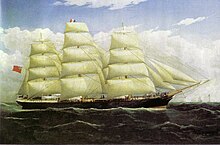Joseph James Coleman FRSE (often referred to simply as J. J. Coleman) (1838–1888) is credited with invention of a mechanical dry-air refrigeration process first used in the sailing ship ‘’Dunedin’’ and sometimes referred to (as a ship type) as Reefer ships. The process focussed upon the use of compressed air for its chilling effects.[1] The effect, which also led to the development of air-conditioning, is known as the Bell-Coleman effect or Bell-Coleman Cycle.[citation needed]


Life
editLittle is known of his life other than he began his career as an industrial chemist with Young’s Paraffin, Light and Mineral Oil Company in central Scotland. He was a Fellow of the Chemical Institute and a member of the Glasgow Philosophical Society.
In 1877 he was approached by Henry and James Bell, brothers in the shipping company John Bell & Sons, and asked to create a refrigeration process for delivering beef across the Atlantic. This was patented later that year.[2] Together they formed a new company, the Bell-Coleman Mechanical Refrigeration Company, in the same year. In 1879 they fitted out the first ship with the equipment and began trading. This was the SS Circassia. In 1880/81 at the request of New Zealand investors the sailing ship Dunedin was re-equipped as a refrigerated ship and became the first financially successful vessel as a freezer ship.[3] The Bell brothers also took the new technology to the High Street, opening a series of butcher shops across Britain selling chilled meat also from 1879. This quickly grew, and within ten years they had 330 premises.
In the 1880s the Bell-Coleman Company is listed as having offices at 45 West Nile Street in the centre of Glasgow and J J Coleman was living at Fern Villa in Bothwell.[4]
Coleman was elected a Fellow of the Royal Society of Edinburgh in 1886, and addressed the Society on his new process.[5] His proposers as a Fellow included Lord Kelvin, John Gray McKendrick, James Thomson Bottomley and Sir James Dewar.[6]
He died on 18 December 1888.
References
edit- ^ Minutes of Proceedings of the Institute of Civil Engineers, 1882, p.170
- ^ The History of Foreign Investment in the United States, to 1914, Mira Wilkins, p.308
- ^ "Forum Categories". meatcuttersclub.activeboard.com. Retrieved 12 February 2018.
- ^ Glasgow Post Office Directory 1882-3
- ^ "Address on Processes of Refrigeration | Proceedings of the Royal Society of Edinburgh | Cambridge Core". journals.cambridge.org. Retrieved 12 February 2018.
- ^ "Former Fellows of The Royal Society of Edinburgh 1783 – 2002 | Biographical Index Part One" (PDF). 29 June 2006. Archived from the original (PDF) on 24 January 2013. Retrieved 12 February 2018.